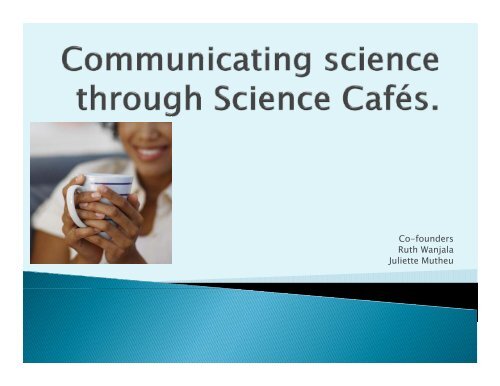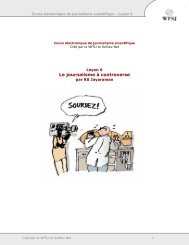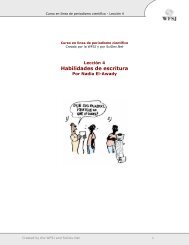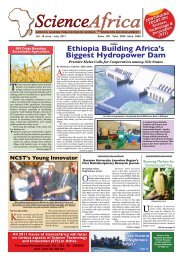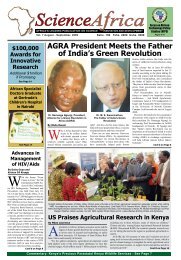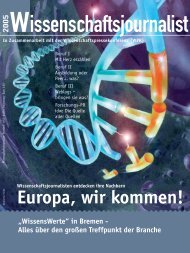Co-founders Ruth Wanjala Juliette Mutheu
Co-founders Ruth Wanjala Juliette Mutheu
Co-founders Ruth Wanjala Juliette Mutheu
Create successful ePaper yourself
Turn your PDF publications into a flip-book with our unique Google optimized e-Paper software.
<strong>Co</strong>-<strong>founders</strong><br />
<strong>Ruth</strong> <strong>Wanjala</strong><br />
<strong>Juliette</strong> <strong>Mutheu</strong>
• 2002 Ubuntu Minute on Science and Technology for<br />
Sustainable Development - Science, Research, Technology and<br />
Innovation are indispensable fundamental engines of sustainable<br />
development.<br />
• 2003 NEPAD Workshop on Developing a Shared<br />
Pl Platform tf for f Science S i and d Technology T h l for f Af Africa’s i ’<br />
Development - acknowledged the need for science and technology<br />
to be championed as priority instruments of economic and social<br />
development at the highest level of government
• African Ministerial <strong>Co</strong>nference on Science and Technology (AMCOST)<br />
2006 Plan of Action - indicates that scientific and technological development cannot be<br />
achieved in Africa without the participation and support of the populace and their political institutions.<br />
According to this Plan of Action Action, scientific and technological development requires active engagement<br />
of policymakers, politicians, youth, women, private industry and other groups of stakeholders
� A science café/cafe scientifique is a forum for discussing/debating topical and<br />
thought provoking scientific issues with the public in a relaxed, informal,<br />
accessible manner in the presence of the media media.<br />
�� Regular meetings are organized in a café/bar or any other informal setting<br />
where one or several scientists are invited to talk in layman's terms about<br />
their work in a topical or even controversial area. The events are known for<br />
their informal and friendly atmosphere.
� In 1997, Marc Sautet started Café Philosophique in France<br />
� In 1998, Duncan Dallas replicated the idea to Café Scientific/Science Café<br />
� By the year 2000 the Cafe scientific model had been dapated in Europe, SE Asia, the<br />
Americas, Australia etc.<br />
� IIn 2007 2007, 23 young Af African i science i communicators i t iintroduced t d d tto th the Si Science<br />
Café concept, in South Africa, British <strong>Co</strong>uncil seminar<br />
� In 2008 two young Kenyans set up the Kenya Science Cafés (after Egypt<br />
� In 2008, two young Kenyans set-up the Kenya Science Cafés (after Egypt,<br />
Cameroon, South Africa, Ghana, Uganda). Malawi Science Cafés begun in 2009.
� Informal dialogue forums on topical<br />
scientific issues in Kenya<br />
� HHeld ld in i C<strong>Co</strong>ffee ff h houses within i hi NNairobi: i bi<br />
Weekday evenings from 6-8pm or<br />
Saturday Afternoons 1- 4pm<br />
� Introduction>Questions>Discussion<br />
� In attendance Scientists (guest speakers),<br />
public majority of whom are of non<br />
scientific backgrounds, Media and<br />
government personnel.<br />
� Advertised through: Email (Cafe<br />
� Advertised through: Email (Cafe<br />
database), Facebook, Twitter,<br />
KenyaBuzz.
� Importance of Science in Africa and its potential impact<br />
in development<br />
� Meaningful scientific information shelved and was not<br />
getting out to the public<br />
�� Kenyans asking questions and not really getting<br />
answers<br />
� Frustration with improper/incorrect media coverage on<br />
health and science research<br />
� Novelty and Informalities of Science Cafés<br />
� Create a “Science Culture” and an appreciation for<br />
� Create a Science Culture and an appreciation for<br />
Science in Kenya as opposed to entertainment and<br />
political culture
HIV Vaccine<br />
Malaria the research in Kenya and East Africa<br />
Climate Change Childhood Mortality: Why So High?<br />
The Role of Male Circumcision for HIV Prevention<br />
Women’s Health<br />
Using maps to get informed on Health, Environment and Technology<br />
Science Medical and Research Ethics in Kenya.<br />
Cancer Cancer in in Kenya Kenya Men’s Men s Health Health Issues Issues<br />
Will the Fibre Optic Cable change the lives of Kenyans?
Kenyan Science Cafés,<br />
c/o KEMRI-Wellcome Trust Research Programme<br />
P.O. Box 43640 – 00100, Nairobi, Kenya<br />
Tel: +254 20 2715160/2720163/2719936<br />
Email:<br />
<strong>Juliette</strong> <strong>Mutheu</strong>: jmutheu@nairobi jmutheu@nairobi.kemri-wellcome.org<br />
kemri wellcome org<br />
<strong>Ruth</strong> <strong>Wanjala</strong>: rwanjala@nairobi.kemri-wellcome.org<br />
kenyan.scicafe@gmail.com<br />
Blog: http://kenyanscicafe.blog.com/<br />
Twitter:http://twitter.com/KenyanSciCafe<br />
Facebook:http://www.facebook.com/


